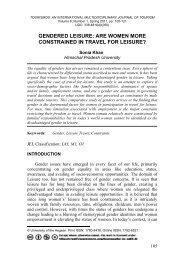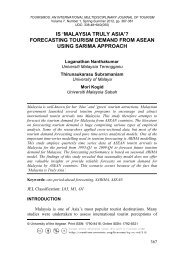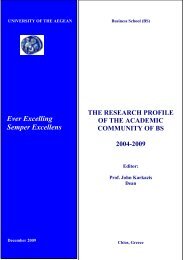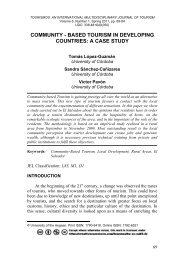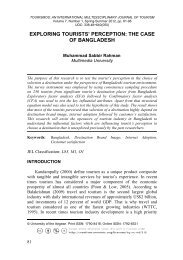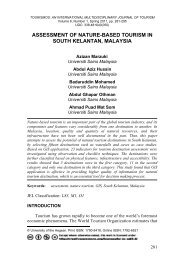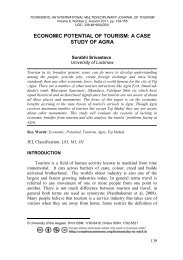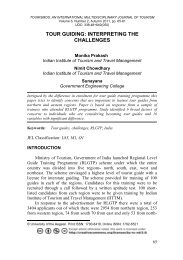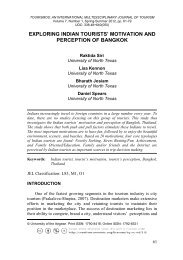TOURISMOS is an international, multi-disciplinary, refereed (peer ...
TOURISMOS is an international, multi-disciplinary, refereed (peer ...
TOURISMOS is an international, multi-disciplinary, refereed (peer ...
Create successful ePaper yourself
Turn your PDF publications into a flip-book with our unique Google optimized e-Paper software.
Sonia Kh<strong>an</strong><br />
the image the breadwinners <strong>an</strong>d it <strong>is</strong> desired of men to take their<br />
employment seriously. For employed men, travel for le<strong>is</strong>ure c<strong>an</strong> be<br />
undertaken only during holidays from work. Thus, for men, time<br />
constraint due to professional obligations <strong>is</strong> <strong>an</strong> influential factor<br />
negatively affecting le<strong>is</strong>ure travel.<br />
Relatively lesser women i.e. 90(45%) report employment to be a<br />
constraint, as majority of women in the sample are non-working. While<br />
working women view the time limitation due to paid employment as a<br />
constraint, it <strong>is</strong> largely the non-working female population that associates<br />
lack of fin<strong>an</strong>ces due to unemployment, as a major constraint to engage in<br />
le<strong>is</strong>ure travel. If unemployment <strong>is</strong> related to fin<strong>an</strong>cial constraints,<br />
especially, low-income employed women, unemployed or single parents<br />
are more likely to view employment status as a constraint due to low<br />
earning or savings.<br />
Most non-working females travel with their families, (parents or<br />
spouse) who fin<strong>an</strong>ce their le<strong>is</strong>ure travel. Thus, they do not perceive<br />
unemployment as a constraint. Unemployment on the other h<strong>an</strong>d,<br />
removes the time restrictions on one’s life, as women who are not<br />
engaged in paid employment feel free to take time off for vacations<br />
whenever it suits them, their spouse <strong>an</strong>d/or family.<br />
CONCLUSION AND IMPLICATIONS<br />
Of all the constraints studied in th<strong>is</strong> study, the striking difference<br />
between men <strong>an</strong>d women <strong>is</strong> found on perceiving their gender as a<br />
constraint to travel for le<strong>is</strong>ure. While more th<strong>an</strong> 50% women report their<br />
gender as a constraint, interestingly 100 % men report their gender to not<br />
be a constraint. It c<strong>an</strong> be thus concluded gender remains vital in<br />
determining the liberty to travel. In le<strong>is</strong>ure, women remain ‘relatively’<br />
more constrained th<strong>an</strong> men.<br />
Though other socio-demographic constraints operate on both<br />
genders, the extent of their influence varies. For men, employment <strong>is</strong> a<br />
major constraint to le<strong>is</strong>ure travel, while for women, family responsibilities<br />
<strong>an</strong>d spousal / family domin<strong>an</strong>ce exacerbate the gender constraint. The<br />
‘doing gender’, poses restrictions on the freedom of women.<br />
However, assessing the responses of females, it <strong>is</strong> noted that there <strong>is</strong><br />
a near equal div<strong>is</strong>ion of responses in all other factors being perceived as a<br />
constraint or not. Th<strong>is</strong> clearly suggests that it c<strong>an</strong> no longer be assumed<br />
that women are always the d<strong>is</strong>adv<strong>an</strong>taged gender. Times have ch<strong>an</strong>ged<br />
<strong>an</strong>d there <strong>is</strong> modernization of societies. With rapid social ch<strong>an</strong>ges <strong>an</strong>d<br />
116



